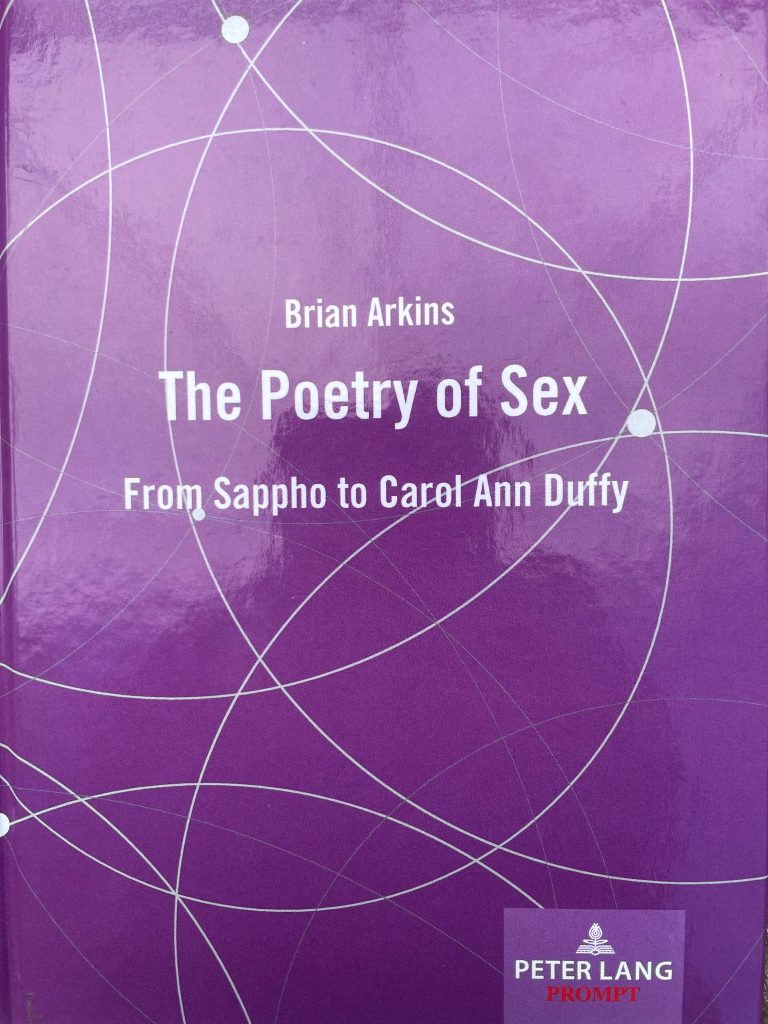
The Poetry of Sex: From Sappho to Carol Ann Duffy by Brian Arkins. Peter Lang, 133 pages, 2023.
Reviewed by Kevin T McEneaney
The bibliography of this book has more books cited than there are pages in this densely written book that covers nearly three-thousand years, although the many happenstances of sex occurred millions of years ago. As far as surviving poetry texts go, we must start with Sappho—Arkins has translated some of her poems and his commentary covers many languages (other than English) with which he is familiar: Greek, Latin, Irish, Italian, French, and German.
While Sappho wrote in an autobiographical manner, we have few existing texts. The cornucopia of texts quoted here, including drama, that Arkins examines offers a shimmering rainbow of cultural and personal observations. He strives for an intelligent comprehension of this rainbow. Incredibly, the translations of all foreign-language texts examined are his own translations.
The large canvas features a cascade of close-ups on the cultural contexts of love poetry that consider cultural or personal landmarks. There is excellent coverage of Greek drama, Roman poetry and drama, and superb coverage of Catullus, Chaucer, Racine, Molière, and Shakespeare, and contemporary English and American poets, especially Irish poets. One disappointment was the omission of the story of Abelard and Heloise, although some troubadour poets, Verlaine, and Rimbaud are considered. (This study can be supplemented by How the French Invented Love by Marilyn Yalom, Harper Perennial, 2012.)
The organization of the book is divided into five topics: Heterosexual love: Happiness: Heterosexual love: Unhappiness; Marriage; Gay love; Lesbian love. The commentary delivers much wisdom and humor.
On happy love, the longest chapter, Heinrich Heine and Robert Burns are lauded while the contemporary laurel lands on the poem Je’taime by the Irish poet Desmond Egan. On the subject of unhappy love, which comments on the obstacles to love, Sophocles, Virgil, Aphra Behn, Goethe, Mallarmé, W.B. Yeats and others are discussed with cogent commentary.
The central chapter on marriage remains the hinge of the book, its double wings ascending into the investigation of personal flight amid the complexities of social life. The epithalamium tradition is discussed, even though that tradition currently appears defunct. Here the eloquence of Shakespeare and Elizabeth Barrett Browning dominate, along with the Irish masterpiece The Lament for Art O’Laoghaire by Eibhlin Dubh, which will be a revelation to many readers.
In the chapter on gay love, Arkins champions Walt Whitman and the San Francisco poet Thomas Gunn, as well as the Irish poet James Liddy. I think the latter’s Collected Poems to be more significant than the work of Gunn, or even poems by Frank O’Hara or John Ashbery. There are comments on A. E. Housemen and W. H. Auden. The chapter on lesbian love extolls Sappho, Emily Dickinson, H. D., and Adrienne Rich while discussing assorted contemporary poets, yet omits Marianne Moore and Elizabeth Bishop—a short book can’t cover everything in such a large subject, although the names of so many poets are mentioned that the list of names would be thrice as long as this review. Here he observes the inclination toward paratactic syntax.
In Florida, Governor DeSantis has ordered the bowdlerization of Shakespeare for high schools and universities. Shakespeare’s wide-ranging humor on the subject of sex, which permeates the book’s witty meanderings, is supposedly a danger to anyone between the age of ten and twenty-one. Despite this, every college professor would be better off with this book stocked inside the walls of a college library, a fortress which the young are not likely to assault. The danger of profound thought on sexual and social mores is much exaggerated in a culture dominated by advertising and greed.
This book functions as both spur and guide for one to arrive at one’s own conclusions regarding the most difficult problems we sapiens confront in our lives, yet it is precisely this difficulty that permits us to articulate poetry with such varied energy.
Over the past forty years Brian Arkins has published about two dozen scholarly books that have been reviewed with extraordinary acclaim. This book will echo with haunting resonance in your mind.